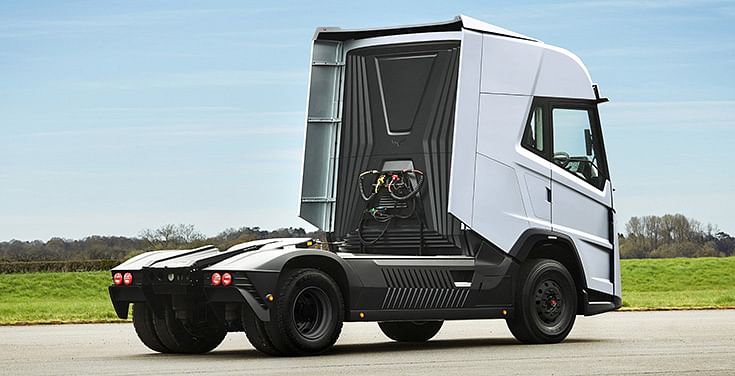UK’s HVS unveils 40-tonne hydrogen truck with 600km range
Reinvention of commercial vehicle design, aimed at optimising range, payload, weight distribution, direct vision, aerodynamics and ergonomically practical cab design; can be refuelled in 20 minutes.
Zero-emission, hydrogen-powered commercial vehicle innovator, Hydrogen Vehicle Systems (HVS) has unveiled a clean-sheet-designed hydrogen-electric Heavy Goods Vehicle (HGV).
Showcasing its game-changing hydrogen powertrain in the form of a 40-tonne HGV technology demonstrator underlines the company’s objective of being the first indigenous UK-designed and developed hydrogen-electric HGV on the market.
The Glasgow-based company, which focuses on the ground-up design and development of zero-emission hydrogen-powered commercial vehicles, has a defined route to market. In addition to funding from the Advanced Propulsion Centre, Innovate UK, Scottish Enterprise and Energy Technology Partnership, HVS’ strategic investment partner is the service station and grocery corporation, EG Group, offering hydrogen refuelling infrastructure, fleet customer base and the potential for global scalability.
Jawad Khursheed, CEO of HVS, said: “We are delighted to reveal our 40-tonne HGV. This technology demonstrator showcases our ground-breaking hydrogen-electric commercial vehicle design and advanced powertrain technology. Our zero-emission trucks are a key part of decarbonising the logistics sector. Hydrogen is the perfect fuel for the haulage industry, offering long ranges and quick refuelling thanks to stations being easily integrated into existing key transport networks.”
Ground-up design delivers multiple innovations
HVS’ tractor units will be built on an all-new chassis, designed in-house around the hydrogen powertrain, which consists of pressurised hydrogen cylinders, fuel cells, an energy storage system and electrified rear axle.
According to HVS, the unique ground-up design brings innovation in packaging, performance, efficiency, weight, range, consumption, maintenance, and lifecycle benefits. The technology demonstrator’s unique design allows significantly improved aerodynamics compared with current Internal Combustion Engine (ICE) trucks.
Consequent benefits include enhanced fuel efficiency on long-haul runs and improved spatial ergonomics within the cab, including better access and more room at the controls, and also aesthetics.
State-of-the-art fuel cell stack
HVS’ vehicle powertrain employs a fuel cell system and energy storage system to deploy electricity to an electric motor to transmit power to the wheels. It uses the KERS (Kinetic Energy Recovery System) to recapture energy under braking and while the truck is slowing down.
The integrated powertrain is controlled with HVS' advanced control system ‘SEMAS,’ which monitors interactions between drivers and control systems, delivering class-leading fuel efficiency and durability.
The fuel cell permits longer range, higher load-carrying capacity, and faster refuelling than would be possible using battery-electric technology alone: typical refuelling time is comparable to diesel, around 20 minutes to replenish the high-pressure hydrogen tanks. It is in the long-distance HGV segment that hydrogen fuel cells offer the most advantages.
 HVS claims the hydrogen-powered heavy goods vehicle delivers a class-leading 600-kilometre range and can be refuelled in 20 minutes.
HVS claims the hydrogen-powered heavy goods vehicle delivers a class-leading 600-kilometre range and can be refuelled in 20 minutes.
Long ranges and quick fill-ups
Depending on the journey – the route travelled, road conditions and driving style – HVS’ HGV has the capacity to travel up to 370 miles (600km).
Hydrogen-powered vehicles don't need charging like a battery-powered Electric Vehicle. They are refuelled with hydrogen gas, stored at pressure in hydrogen cylinders. Refuelling takes a much shorter time than charging an equivalent battery vehicle and is comparable to filling a truck with diesel (about 15 to 20 minutes).
HVS, which is undertaking development work at Horiba MIRA, Nuneaton, Warwickshire, envisages that it will open an R&D, engineering and pilot production facility alongside a permanent UK-based production facility. Other variants of the hydrogen-fuelled 4x2 HGV tractor unit, including a left-hand drive variant, are also in the pipeline.
ALSO READ:
Faurecia showcases breakthrough hydrogen solutions at Hannover Messe
Toyota to supply hydrogen fuel cell modules to European truck company Hyliko
RELATED ARTICLES
Autoliv Plans JV for Advanced Safety Electronics With China’s HSAE
The new joint venture, which is to be located strategically near Shanghai and close to several existing Autoliv sites in...
JLR to Restart Production Over a Month After September Hacking
Manufacturing operations at the Tata Group-owned British luxury car and SUV manufacturer were shut down following a cybe...
BYD UK Sales Jump 880% in September to 11,271 units
Sales record sets the UK apart as the largest international market for BYD outside of China for the first time. The Seal...






 By Autocar Professional Bureau
By Autocar Professional Bureau
 19 Apr 2023
19 Apr 2023
 11042 Views
11042 Views










 Ajit Dalvi
Ajit Dalvi




